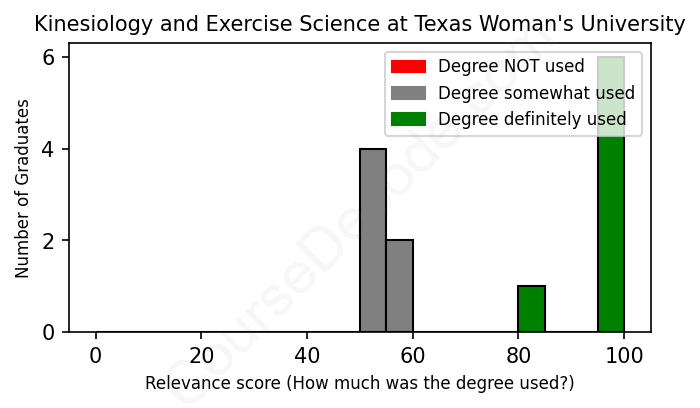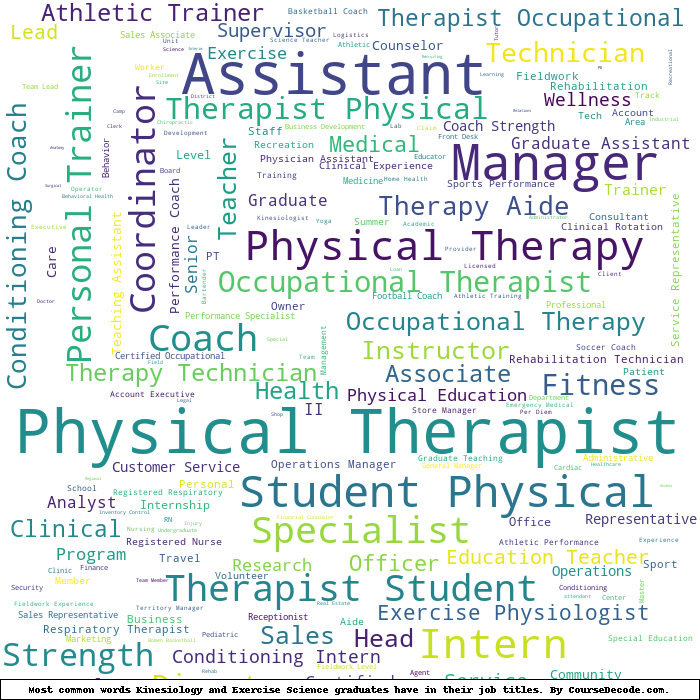
First, some facts. Of the Kinesiology and Exercise Science graduates from Texas Woman's University we've analyzed , here's how many have used (or NOT used) their degree in their career:

These are estimates based on AI analysis of 13 LinkedIn profiles (see below).
The verdict? Above average. Overall, with an average relevance score of 76%, Kinesiology and Exercise Science graduates from Texas Woman's University have a higher likelihood (+9%) of finding work in this field compared to the average graduate across all fields:
And for comparison, here's the chart for all profiles we've looked at across all degrees.
Also, after graduating, 53% of these graduates have pursued further education other than another Bachelor's degree (such as a Masters degree or other), compared to the average across all profiles of 35%. This suggests you may need more than just a Bachelors degree to be competitive as a Kinesiology and Exercise Science graduate.
See the details:
|
Relevance score: 100% We think this person has gone into a career highly relevant to their degree. We think this person has gone into a career highly relevant to their degree.
DEGREE INFOGraduated in 2012 from Texas Woman's University with a Bachelor of Science (B.S.) in Kinesiology and Exercise Science. Also pursued further education since (see below). JOB HISTORY SINCE GRADUATIONIntern Medical Center of Lewisville May 2012 - Aug 2012 Intern  Medical City of Plano Jan 2016 - May 2016 Gymnastics Coach  Infinite Bounds Jan 2013 - Nov 2017 Exercise Physiologist  Healthcare Associates of Texas Oct 2017 - Jan 2020 Team Coach  Metroplex Gymnastics & Swim Aug 2020 - Jul 2022 FURTHER DEGREES DONE SINCE GRADUATINGMaster of Science (MS)Texas Woman's University 2014 - 2016 ABOUTACSM Certified Exercise PhysiologistBLS, CPR and AED certified USAG professional member, girls artistic coach and compulsory judge |
The top 10 most common jobs done by the graduates we've analyzed (ranked most common to least) are:
When looking at the kinds of jobs that graduates from Texas Woman's University with a degree in Kinesiology and Exercise Science have taken, it seems like there's a huge focus on healthcare-related roles, especially as Respiratory Therapists and Physical Therapists. Many of them have found their niche in clinical settings, which makes perfect sense given their education. These positions require a solid understanding of human anatomy, rehabilitation techniques, and exercise physiology, all super relevant to what they studied. For example, jobs like Registered Respiratory Therapist or Occupational Therapist directly use the knowledge gained in their degree programs and show a clear path from education to career.
However, not all the roles fit neatly into the Kinesiology or Exercise Science categories. Some graduates have taken positions in sales, customer service, or even as veterinary technicians, which don't relate as much to their academic background. While these jobs might allow them to use some soft skills or general health knowledge, they don't tap into the core concepts of kinesiology or exercise science. Overall, while many graduates are in relevant jobs that align with their degree, a notable number have ventured into fields that deviate from their training, suggesting that the job market can be pretty flexible, but possibly at the cost of directly applying their degree knowledge.
Here is a visual representation of the most common words in job titles for Kinesiology and Exercise Science graduates (this is across all Kinesiology and Exercise Science graduates we've analyzed, not just those who went to Texas Woman's University):

Looking at the career paths of graduates from Texas Woman's University with degrees in Kinesiology and Exercise Science, it seems like their journeys vary quite a bit, especially in the initial years after graduation. Many of them start off in supportive roles that are somewhat related but don't always align perfectly with their field of study. For instance, some graduates took on roles like Sales Support or went into healthcare-related jobs that could be connected to kinesiology like Registered Respiratory Therapist or Cardiac Rehab Intern. However, there are also graduates who veered off into less relevant roles, such as Veterinary Technician or Customer Service. It's clear there’s a mix of dynamics here, with some taking the direct route into physical therapy and exercise physiology and others exploring different options.
As time goes by, the picture gets a bit clearer. Five to ten years after graduating, many of these individuals have landed roles that are more aligned with their Kinesiology and Exercise Science background. We can see graduates becoming Occupational Therapists, Physical Therapists, and Exercise Physiologists, which are all strong positions in the health and wellness field. Those who started in related positions tended to have a more straightforward path into their desired careers. For instance, several have moved on to solid roles in rehabilitation and health coaching. Overall, while the early career paths can be a bit eclectic, it appears that many find their way back to meaningful careers within their field after a few years of experience. So, while not every graduate goes straight into their dream job right out of college, a lot of them eventually find fulfilling careers relevant to what they studied at Texas Woman's University.
Honestly, a Bachelor’s degree in Kinesiology and Exercise Science can be a mixed bag depending on your strengths and interests. At Texas Woman's University, like at many schools, you'll dive into subjects like anatomy, physiology, biomechanics, and exercise psychology, which can be pretty challenging if you’re not into science. Some students find the hands-on experiences and labs really engaging, while others might struggle with the more technical stuff. Overall, it’s often considered a bit easier than some hardcore science majors like engineering or chemistry, but it still requires commitment and good study habits. If you're someone who loves being active and enjoys learning about how the body works, you might find it more manageable and even fun!
Most commonly, in the LinkedIn profiles we've looked at, it takes people 3 years to finish a Bachelor degree in Kinesiology and Exercise Science.
So, looking at these Kinesiology and Exercise Science grads from Texas Woman's University, it seems like their earnings potential varies quite a bit based on their job choices. Some, like the registered respiratory therapists and occupational therapists, are likely making decent money since those positions typically offer solid salaries. Others, like sales support or internships, are probably earning way less, especially starting out. Job stability seems okay, with many switching between roles in healthcare and rehabilitation, suggesting they might find better opportunities as they gain experience. Overall, it looks like a mixed bag when it comes to making decent money—some are likely doing well, while others are still on their way up.
Here is a visual representation of the most common words seen in the "about" section of LinkedIn profiles who have a Bachelor degree in Kinesiology and Exercise Science (this is across all Kinesiology and Exercise Science graduates we've analyzed, not just those who went to Texas Woman's University). This may or may not be useful:

Here are all colleges offering a Bachelor degree in Kinesiology and Exercise Science (ordered by the average relevance score of their Kinesiology and Exercise Science graduates, best to worst) where we have analyzed at least 10 of their graduates: